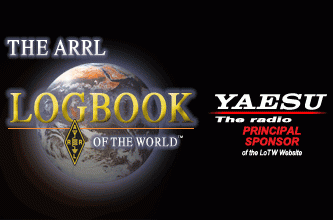Trusted QSL V2.7.1 released
TQSL is free software used to upload and sign logs to the ARRL Logbook of the World (LoTW). TQSL works with Windows, MacOS and Linux. LoTW is free to all Amateur Radio Operators around the world, and membership in the ARRL is not required to use LoTW.
The latest version of TQSL can be downloaded from the ARRL website.
Trusted QSL V2.7 Release Notes
This version of Trusted QSL (TQSL) has new features as well as corrections for defects found since TQSL 2.6.5 was released.
Updates since TQSL 2.6.5:
This release includes an update to the most recent TQSL configuration file.
There were no serious defects reported for TQSL 2.6.5. This release contains several minor updates which have accumulated since 2.6.5.
TQSL 2.7 can be installed to upgrade any older version of TQSL.
For the Mac platform, TQSL now uses a package file (.pkg) for installing TQSL. This is hopefully easier to use as it is a familiar way to install software for most Mac users.
On all three supported platforms (Windows, MacOS, and Linux), installing TQSL 2.7 will replace older versions of Trusted QSL while preserving your Callsign Certificates, Station Locations, and preferences. On Windows, simply run the TQSL 2.7 installer, which will automatically uninstall older versions of TQSL (and, if installed, TQSLCert). On Mac OS X, open the package (.pkg) file to install TQSL into your Applications folder. (Note that the “tqsl-legacy” package is for legacy Mac systems – 32 bit Intel and PowerPC.) Direct the installer to “Replace All”, which will uninstall old files.
For Linux systems, I recommend using the copy on Flathub: https://flathub.org/apps/org.arrl.trustedqsl – That is a portable Linux package that will run on many 64-bit Linux systems (x86_64 and ARM64). If you need to build from source, unpack the tar file and read the INSTALL file for directions. You will need development libraries for zlib, curl, openssl, sqlite3, wxWidgets, and expat.
TQSL 2.7 has been “localized” to allow use in the native language of non-English speakers. This could not have been done without the help of the volunteers who have contributed translations for TQSL.
Thanks to the following for their assistance:
Catalan: Xavier, EA3W
Chinese (Simplified): SZE-To, VR2UPU
Chinese (Traditional): Caros, BH4TXN
Finnish: Juhani, OH8MXL
French: Laurent BEUGNET, F6GOX
Hindi: Manmohan, VU3YBH
German: Andreas, DF4WC
Italian: Salvatore, IV4FYV
Japanese: Akihiro, JL3OXR
Portuguese: Nuno, CT2IRY
Russian: Vic, US5WE
Spanish: Jordi, EA3GCV
Swedish: Roger, SM0LTV
Turkish: Ojuzhan, TA2NC
The following list describes the major changes in the v2.7 release of Trusted QSL.
TQSL changes
Defects Corrected:
When upload a Callsign Certificate to Logbook, TQSL would not properly handle error messages from Logbook, for example cases where the request was not accepted. TQSL would then mark the request as “Pending ARRL” when it was rejected and wouldn’t be acted on. TQSL now decodes these error messages properly.
Portable callsign handling has been corrected so they work as Logbook expects. When one submits a portable call (W1A1/1 or K1MU/P5) Logbook requires the use of an existing callsign certificate to validate (This is called “signing” the callsign certificate request, which is required for portable calls.)
When handling requests for US-based portable callsigns (P5XXX/W4), TQSL would look up the home callsign in the FCC ULS database and reject the request. Non-US portable call handling no longer tries the ULS lookup.
When handling requests for US-based 1×1 callsigns, TQSL would always check in the FCC ULS database to see if the callsign is valid. This would mean that operators with pending requests could not submit a callsign certificate request until the ULS database is updated. For any case where the callsign certificate request has an end date, no ULS lookup is performed for 1×1 calls. This is always going to be the case for valid 1×1 assignments.
Major feature Additions:
TQSL has a database for recording uploaded QSOs that is used to detect duplicate QSOs. TQSL used the Oracle BerkeleyDB for that data, which proved to be unusable as Oracle BerkeleyDB frequently corrupted the database to the extent that it could not be opened or repaired. After several cycles of trying increasingly aggressive attempts to delete corrupted databases (thus losing the entire upload history), TQSL no longer uses BerkeleyDB for this data. This conversion is performed quietly upon the first use of TQSL 2.7 where the previous automatic backup is used to reinstall the contents.
Minor Updates:
When processing the OPERATOR ADIF tag, TQSL would emit a fatal error message if the string resented was too long to be a callsign (more than 20 characters.) TQSL now ignores these cases and does not use the OPERATOR field when it is too long to be a callsign.
Update the encryption algorithm used for saving callsign certificates (P12 files) from RC2 (which is long deprecated) to AES-256, a currently encryption scheme.
The TQSL packaging for Linux (metadata about file locations, etc.) has been updated to conform to standards.
Correct issues with the TQSL ADIF editor where some modes (PKT, PAC, FM) were not processed properly. Correct an issue where the ADIF editor could emit the SUBMODE for a mode twice. Add a preference that allows ignoring callsigns in ADIF files being signed (this ignores operator callsign, not the calls of stations being worked.)
Add an undocumented command line option to TQSL to allow wiping of the uploads database in the event that it becomes corrupted. This avoids users having to manually remove bad databases.
Reinstalling TQSL 2.6.5
Downgrading to TQSL 2.6.5 can be seamlessly performed by uninstalling TQSL 2.7 and reinstalling TQSL 2.6.5.

